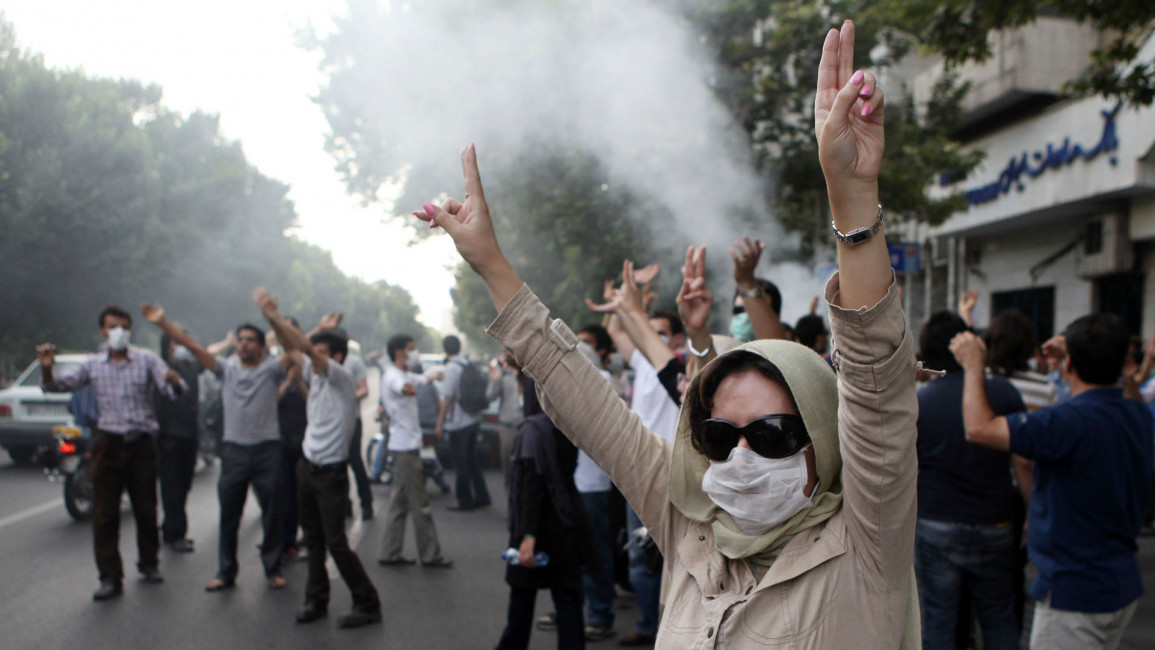
Trump and Rouhani: A tale of two presidents
Trump and Rouhani: A tale of two presidents
Comment: Discontent over expensive foreign wars and rising unemployment; to Trump, the concerns of Iranian protesters must sound eerily familiar, writes Hadani Ditmars.
3 min read
A new wave of protests began in Iran last Thursday [Getty]
While current unrest in Iran may provide foreign presidents with prime schadenfreude tweeting opportunities, the likes of Donald Trump and Benjamin Netanyahu might well remember to be careful what they wish for.
Besides providing the embattled Iranian regime with a prime opportunity to blame the spontaneous protests on "foreign meddling" (and with the historical intervention of the CIA and MI6 who could blame them), the protests against poverty, corruption, religious authoritarianism and billions spent on foreign war budgets have a familiar ring.
While most political amnesia is opportunism writ large, as Netanyahu wishes "brave Iranians" success as they take to the streets, it's hard not to think of the huge protests that swept Tel Aviv last month against his own alleged corruption, calling for his resignation or the ongoing protests against the rising cost of living and growing gap between rich and poor.
As Netanyahu scolds the Iranian regime from his supposed moral higher ground, images of 16-year-old anti-occupation protestor Ahed Tamimi being detained by Israeli soldiers spring to mind, not to mention the costs of ongoing military occupation of Palestine.
And then there's growing discontent among secular Israelis with the amount of political power and economic resources given to their nation's religious right-wing.
Mr Trump's triumphalist tweets about the evils of the Iranian regime and support for protestors speak to a plethora of elephants in the room.
 |
In fact, Trump and Rouhani may have more in common than one might imagine |  |
Six months after Charlottesville, when the American president equated alt-right and antifa violence, he might want to tread more carefully - especially given his current 32 percent approval rate and accusations of obstruction of justice.
He might do well to note that Rouhani came to power last summer, promising more political freedom and to fix Iran's moribund economy - familiar slogans from Trump's own campaign. Meanwhile, Trump - whose travel ban and hostility toward Iran lend him little credibility on the ground - has recently helped cement his own nation's obscene gap between rich and poor with tax reform to aid his billionaire pals.
And as Iranian protestors call for an end to costly foreign wars, has he forgotten his own $15 billion increase in his nation's defence budget last May, helping to fund wars in Afghanistan, Iraq and Syria?
And as Iranian protestors call for an end to costly foreign wars, has he forgotten his own $15 billion increase in his nation's defence budget last May, helping to fund wars in Afghanistan, Iraq and Syria?
And surely with his evangelical base, Trump can't be deaf to Iranian protestors' calls for an end to corrupt and authoritarian religious rule?
Read more: European leaders' response to Iran protests is weak and disingenuous
Read more: European leaders' response to Iran protests is weak and disingenuous
In fact, Trump and Rouhani may have more in common than one might imagine. With most millennials opposed to Trump, and the majority of Iranian protestors under 25, both leaders are in the midst of generational warfare.
While Trump is more of a tweeter than a reader, he would do well to consider Omar al-Akkad's debut novel American War, which imagines a dystopian American landscape ravaged by civil war and climate change, full of refugee camps and disenfranchised impoverished youth drawn to terror, painting scenes that bear an eerie similarity to today's Middle East.
 |
The Iranian Spring may well prove as elusive as the Arab one |  |
While the Iranian Spring may well prove as elusive as the Arab one, Trump is facing turbulent times. His calls for regime change may come to haunt him, and the American people - struggling to survive as their indifferent leaders retreat to a world of cronyist corrupt bungling - may find strange kinship with their Iranian brethren.
Hadani Ditmars is the author of Dancing in the No Fly Zone: a Woman's Journey Through Iraq. A former editor at New Internationalist, she has been reporting from the Middle East for two decades. Her next book, Ancient Heart, is a political travelogue of Iraqi heritage sites.
Follow her on Twitter: @HadaniDitmars
Opinions expressed in this article remain those of the author and do not necessarily represent those of The New Arab, its editorial board or staff.




